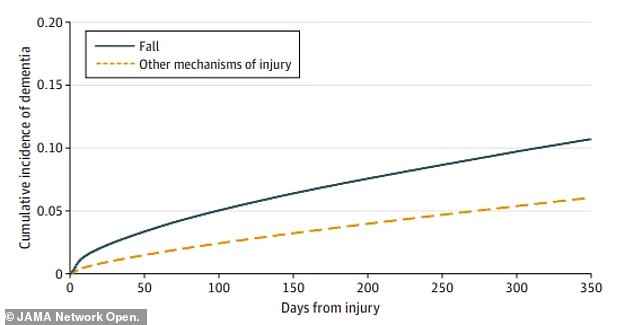It may seem like just part of the aging process, but suffering a fall could dramatically increase your risk of dementia.
Boston researchers evaluated the medical records of more than 2.4 million adults over age 65 and found that those who had gone to the hospital after suffering a fall were 20 percent more likely to be diagnosed with dementia a year later. than their peers.
The researchers said the findings show that older Americans who suffer a traumatic injury should be screened for cognitive problems, which can be a precursor to conditions such as Alzheimer’s.
The United States has approved three drugs to slow the progression of Alzheimer’s disease, but they are most effective when given in the early stages of the disease.
Researchers at Brigham and Women’s Hospital in Boston found that falling late in life increased the risk of dementia by 20 percent.

The graph above shows the rate of dementia diagnoses after an injury. One year after the injury, 10 percent of adults were diagnosed with dementia, compared to six percent for other injuries.
Dr. Molly Jarman, lead author of the study and deputy director of the Center for Surgery and Public Health at Brigman and Women’s Hospital in Boston, said, “Our study highlights the opportunity to intervene early and the need for more physicians who can provide comprehensive care to older people”. adults.
“If we can establish that falls serve as early indicators of dementia, we could identify other precursors and early events upon which we could intervene, which would significantly improve our approach to managing cognitive health in older adults.
The researchers analyzed injury data from Medicare Fee-For-Service, a health care payment system, and included 2.4 million adults age 66 and older. More than half of the participants suffered a fall as a result of their injury.
The majority of participants (91 percent) were white and more than 60 percent were women.
The study, published Monday in Open JAMA Networkfound that one year after a fall, one in 10 participants was diagnosed with dementia, compared to one in 15 of those who suffered a different injury.
After analyzing other factors, falls were associated with a 21 percent increased risk of dementia.
Dr Jarman said: “The relationship between falls and dementia appears to be a two-way street.”
“Cognitive impairment can increase the likelihood of falls, but the trauma caused by those falls can also accelerate the progression of dementia and make a diagnosis more likely in the future.”
“Therefore, falls may act as precursor events that can help us identify individuals who need additional cognitive evaluation.”
The team noted that performing a cognitive test after a fall could help detect dementia at any earlier stage, slowing progression and potentially increasing life expectancy.
Dr. Alexander Ordoobadi, lead author of the study and resident physician in the Department of Surgery at Brigham and Women’s Hospital, said: “One of the biggest challenges we face is the lack of accountability in the screening process for monitoring cognitive decline. because there may not be adequate time for these exams in an emergency department or trauma center.
“Ideally, after an injury, older adults should receive follow-up care with a primary care provider or geriatrician who can monitor their cognitive health and long-term functional recovery after injury, but many older adults do not have a usual primary care provider. and lack of access to a geriatrician.’
Alzheimer’s disease, the most common form of dementia, affects about seven million Americans and almost one million Britons.

